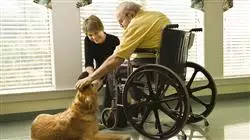University certificate
The world's largest faculty of psychology”
Introduction to the Program
You will have at your disposal the best didactic material, which will provide you with a contextual study to facilitate your learning”

Today, the multiple physical, social and mental benefits of interacting with animals in controlled environments are indisputable. In fact, such benefits were already present in therapeutic contexts long before documented scientific evidence was made widely available. This academic program will focus on gathering and understanding the different lines of intervention used in the area of Animal-Assisted Therapies (AAI).
This training covers advanced and specialized knowledge of AAI as applied to the different disabilities that can be addressed with this type of intervention. Different disabilities will be delineated and differentiated while learning will be focused on specific areas: intellectual, physical, sensory and psychic. AAIs are intended for health or human service providers within a professional setting. They are designed to promote improvement in human physical, social, emotional or cognitive function. They are provided in a variety of settings, both group and individual.
With this training, professionals will have the ability to develop Assisted Therapy methodologies based on specific patient objectives or a systematic methodology that guarantees learning. The development of new therapeutic methodologies to counteract the negative effects of stress generated by social, cultural and biological impact, make Assisted Interventions a natural alternative for integration within the environment.
Psychologists will acquire theoretical and practical skills to work with children, adolescents, adults and elderly people with different types of disabilities. All the interventions in health, education and social areas trained professionals are already familiar with will be given a special focus, including animal participation in the therapeutic, social and educational improvement of patients.
As this is a 100% online academic program, you will be able to balance your studies with your professional work”
This Postgraduate diploma in Animal-Assisted Intervention Programs for Functionally Diverse People contains the most complete and up-to-date program on the market. The most important features of the program are:
- Practical cases presented by experts in Animal-Assisted Therapies
- The graphic, schematic, and eminently practical contents with which they are created, provide scientific and practical information on the disciplines that are essential for professional practice
- Breakthroughs in Animal-Assisted Therapies
- Practical exercises where the self-assessment process can be carried out to improve learning
- Special emphasis on innovative methodologies in Animal-Assisted Therapies
- Theoretical lessons, questions to the expert, debate forums on controversial topics, and individual reflection assignments
- Content that is accessible from any fixed or portable device with an Internet connection
Your goals and ours at TECH become one and the same with this academic program”
The teaching staff is made up of professionals in the field who bring to this program the experience of their work, in addition to recognized specialists from prestigious reference societies and universities.
The multimedia content, developed with the latest educational technology, will provide the professional with situated and contextual learning, i.e., a simulated environment that will provide immersive training programmed to train in real situations.
This program is designed around Problem Based Learning, whereby the professional must try to solve the different professional practice situations that arise during the academic program. For this purpose, the professional will be assisted by an innovative, interactive video system created by renowned and experienced experts in Animal-Assisted Therapies.
Specialization is a great asset when it comes to growing in a booming sector such as Animal-Assisted Therapies"

This Postgraduate diploma is the opportunity you were waiting for to take your career to the next level and become a prestigious Psychologist"
Why study at TECH?
TECH is the world’s largest online university. With an impressive catalog of more than 14,000 university programs available in 11 languages, it is positioned as a leader in employability, with a 99% job placement rate. In addition, it relies on an enormous faculty of more than 6,000 professors of the highest international renown.

Study at the world's largest online university and guarantee your professional success. The future starts at TECH”
The world’s best online university according to FORBES
The prestigious Forbes magazine, specialized in business and finance, has highlighted TECH as “the world's best online university” This is what they have recently stated in an article in their digital edition in which they echo the success story of this institution, “thanks to the academic offer it provides, the selection of its teaching staff, and an innovative learning method aimed at educating the professionals of the future”
A revolutionary study method, a cutting-edge faculty and a practical focus: the key to TECH's success.
The most complete study plans on the university scene
TECH offers the most complete study plans on the university scene, with syllabuses that cover fundamental concepts and, at the same time, the main scientific advances in their specific scientific areas. In addition, these programs are continuously being updated to guarantee students the academic vanguard and the most in-demand professional skills. In this way, the university's qualifications provide its graduates with a significant advantage to propel their careers to success.
TECH offers the most comprehensive and intensive study plans on the current university scene.
A world-class teaching staff
TECH's teaching staff is made up of more than 6,000 professors with the highest international recognition. Professors, researchers and top executives of multinational companies, including Isaiah Covington, performance coach of the Boston Celtics; Magda Romanska, principal investigator at Harvard MetaLAB; Ignacio Wistumba, chairman of the department of translational molecular pathology at MD Anderson Cancer Center; and D.W. Pine, creative director of TIME magazine, among others.
Internationally renowned experts, specialized in different branches of Health, Technology, Communication and Business, form part of the TECH faculty.
A unique learning method
TECH is the first university to use Relearning in all its programs. It is the best online learning methodology, accredited with international teaching quality certifications, provided by prestigious educational agencies. In addition, this disruptive educational model is complemented with the “Case Method”, thereby setting up a unique online teaching strategy. Innovative teaching resources are also implemented, including detailed videos, infographics and interactive summaries.
TECH combines Relearning and the Case Method in all its university programs to guarantee excellent theoretical and practical learning, studying whenever and wherever you want.
The world's largest online university
TECH is the world’s largest online university. We are the largest educational institution, with the best and widest online educational catalog, one hundred percent online and covering the vast majority of areas of knowledge. We offer a large selection of our own degrees and accredited online undergraduate and postgraduate degrees. In total, more than 14,000 university degrees, in eleven different languages, make us the largest educational largest in the world.
TECH has the world's most extensive catalog of academic and official programs, available in more than 11 languages.
Google Premier Partner
The American technology giant has awarded TECH the Google Google Premier Partner badge. This award, which is only available to 3% of the world's companies, highlights the efficient, flexible and tailored experience that this university provides to students. The recognition as a Google Premier Partner not only accredits the maximum rigor, performance and investment in TECH's digital infrastructures, but also places this university as one of the world's leading technology companies.
Google has positioned TECH in the top 3% of the world's most important technology companies by awarding it its Google Premier Partner badge.
The official online university of the NBA
TECH is the official online university of the NBA. Thanks to our agreement with the biggest league in basketball, we offer our students exclusive university programs, as well as a wide variety of educational resources focused on the business of the league and other areas of the sports industry. Each program is made up of a uniquely designed syllabus and features exceptional guest hosts: professionals with a distinguished sports background who will offer their expertise on the most relevant topics.
TECH has been selected by the NBA, the world's top basketball league, as its official online university.
The top-rated university by its students
Students have positioned TECH as the world's top-rated university on the main review websites, with a highest rating of 4.9 out of 5, obtained from more than 1,000 reviews. These results consolidate TECH as the benchmark university institution at an international level, reflecting the excellence and positive impact of its educational model.” reflecting the excellence and positive impact of its educational model.”
TECH is the world’s top-rated university by its students.
Leaders in employability
TECH has managed to become the leading university in employability. 99% of its students obtain jobs in the academic field they have studied, within one year of completing any of the university's programs. A similar number achieve immediate career enhancement. All this thanks to a study methodology that bases its effectiveness on the acquisition of practical skills, which are absolutely necessary for professional development.
99% of TECH graduates find a job within a year of completing their studies.
Postgraduate Diploma in Animal-Assisted Intervention Programs for People with Functional Diversity
Animal-assisted intervention has experienced a great growth in recent years. This type of therapy offers great cognitive and communicative benefits to people suffering from Autism Spectrum Disorders, Intellectual Disability or other mental illnesses. As a result, psychologists specialized in this field are widely demanded to contribute directly to the welfare of human beings with these pathologies. As a result, TECH has created the Postgraduate Diploma in Animal Assisted Intervention Programs for People with Functional Diversity, a program that will increase your skills in this area and boost your professional development.
Enroll in a first level program
Through this program, you will delve into the different types of animals and their characteristics for intervention, the legal and ethical aspects of therapy with these living beings or the cutting-edge techniques to undertake the monitoring and evaluation of patients. This learning will allow you to improve your attention to people with different cognitive disorders, enjoying a 100% online education that will not force you to attend classes in person. Do not hesitate and enroll in this Postgraduate Diploma in Animal Assisted Intervention Programs for People with Functional Diversity!







